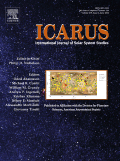
ICARUS
metrics 2024
Charting New Territories in Astronomy and Astrophysics.
Introduction
ICARUS is a prominent peer-reviewed journal dedicated to advancing knowledge in the realm of Astronomy and Astrophysics, as well as Space and Planetary Science. Published by Academic Press Inc, Elsevier Science, this esteemed journal has been contributing to the scientific discourse since 1962 and will continue to do so well into 2024. With an impressive impact factor placing it in the Q2 quartile, ICARUS ranks among the top journals in its field, standing appropriately at #22 out of 90 in Astronomy and Astrophysics and #27 out of 104 in Space and Planetary Science according to Scopus metrics. Researchers, professionals, and students alike benefit from its comprehensive scope, which encompasses a wide array of topics related to planetary processes, space exploration, and astrophysical phenomena. Although it does not currently offer open access, the journal remains a critical resource for scholars seeking to disseminate their findings and engage with cutting-edge research in the exciting fields of astronomy and planetary science.
Metrics 2024
 1.06
1.06 2.50
2.50 2.80
2.80 171
171Metrics History
Rank 2024
Scopus
IF (Web Of Science)
JCI (Web Of Science)
Quartile History
Similar Journals

EARTH PLANETS AND SPACE
Bridging Earth Sciences and Cosmic PhenomenaEARTH PLANETS AND SPACE, published by Springer and based in Switzerland, is a distinguished journal that plays a pivotal role in advancing the fields of Earth and planetary sciences. With an impactful presence in both geology (Q1) and space and planetary science (Q2), this journal is increasingly recognized for its contributions to understanding complex geoscientific processes and extraterrestrial phenomena. The journal has been a vital resource for researchers since its inception in 1996 and is anticipated to continue this legacy until at least 2024. It ranks impressively within the Scopus database, holding the 53rd position out of 321 in Earth and Planetary Sciences for Geology and the 30th position out of 104 for Space and Planetary Science, reflecting a robust percentile standing of 83 and 71, respectively. With open access options available, EARTH PLANETS AND SPACE makes cutting-edge research more accessible to a global audience, fostering collaboration and innovation. This journal is essential for anyone seeking to deepen their knowledge or stay current with trends in Earth sciences and planetary exploration.
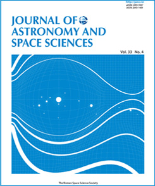
Journal of Astronomy and Space Sciences
Unveiling the Wonders of Astronomy Since 1984.The Journal of Astronomy and Space Sciences, published by the Korean Space Science Society, is a premier open-access platform dedicated to advancing the fields of astronomy, astrophysics, and space sciences. Established in 1984, the journal has been instrumental in disseminating high-quality research findings, fostering collaboration among scientists globally, and providing insights into the dynamics of our universe. With an ISSN of 2093-5587 and an E-ISSN of 2093-1409, the journal has gained notable recognition, currently ranking in the Q3 quartile in Earth and Planetary Sciences and Physics and Astronomy as of 2023. Although the journal's H-Index is currently unspecified, its commitment to rigorous peer-review processes and open-access availability ensures that groundbreaking research is accessible to a wide audience. Based in Seoul, South Korea, the journal is poised to continue supporting innovative research through 2024 and beyond. Researchers, professionals, and students alike will find valuable resources and opportunities within its pages, further establishing this journal as a crucial resource in the exploration of the cosmos.

Earth and Planetary Physics
Illuminating the Path of Earth and Planetary ResearchEarth and Planetary Physics, published by SCIENCE PRESS, is a distinguished open-access journal that has been a vital resource for the scientific community since its inception in 2017. With both ISSN and E-ISSN 2096-3955, this journal contributes significantly to the fields of Astronomy and Astrophysics, Atmospheric Science, and Space and Planetary Science, consistently holding a Q2 quartile ranking across these categories as of 2023. Based in the United States, its editorial board consists of renowned experts dedicated to advancing the understanding of planetary phenomena and Earth processes. The journal prides itself on its rigorous peer-review process and broad readership, facilitating the dissemination of cutting-edge research and innovative methodologies. This commitment is reflected in its strong Scopus rankings, positioning it competitively within its scope—rank #33 in Astronomy and Astrophysics and rank #40 in Space and Planetary Science. As an open-access journal, Earth and Planetary Physics is committed to providing free and global access to high-quality research, thereby enhancing visibility and impact for its authors while catering to researchers, professionals, and students eager to explore the intricacies of our planet and beyond.
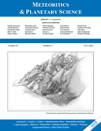
METEORITICS & PLANETARY SCIENCE
Pioneering Research in Meteorites and Beyond.METEORITICS & PLANETARY SCIENCE is a premier journal dedicated to the exploration and analysis of celestial bodies, meteorites, and planetary processes, published by WILEY in the United States. With its ISSN 1086-9379 and E-ISSN 1945-5100, the journal spans a rich timeline from 1996 to 2024, providing a vital platform for researchers and professionals in the fields of Geophysics and Space and Planetary Science. Holding a reputable place in the academic community with a Q2 quartile ranking based on the 2023 metrics, it stands out with Scopus ranks of #54 out of 165 for Earth and Planetary Sciences in Geophysics, and #50 out of 104 in Space and Planetary Science, demonstrating its influence and commitment to advancing knowledge in this fascinating domain. The journal also embraces Open Access options, facilitating widespread dissemination of research findings. By fostering interdisciplinary collaboration and sharing innovative research, METEORITICS & PLANETARY SCIENCE serves as an essential resource for those engaged in understanding the complexities of our solar system and beyond.
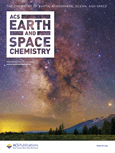
ACS Earth and Space Chemistry
Fostering Collaboration for a Sustainable Planetary FutureACS Earth and Space Chemistry is a leading journal published by the American Chemical Society, dedicated to advancing the interdisciplinary fields of atmospheric science, geochemistry, and planetary science. Since its inception in 2017, this journal has quickly established itself as a pivotal resource for researchers and professionals, boasting an impressive impact factor and securing its position in Q2 of the Scopus rankings for 2023 across its relevant categories. The journal publishes cutting-edge research articles, reviews, and commentaries that explore the chemical processes influencing Earth and space environments. By providing open access to invaluable research from experts around the globe, it encourages collaboration and dissemination of knowledge, crucial for addressing pressing environmental and planetary challenges. Situated in the heart of Washington, D.C., the journal's editorial office works diligently to ensure rigorous peer review and high-quality publications that meet the needs of its diverse audience, including scholars and students keen to stay abreast of developments in these dynamic fields.

ORIGINS OF LIFE AND EVOLUTION OF BIOSPHERES
Connecting Biological Evolution with Planetary SciencesOrigins of Life and Evolution of Biospheres is a distinguished academic journal published by Springer, dedicated to exploring the intricate connections between biological evolution and planetary sciences. Since its inception in 1984, this journal has served as a vital platform for interdisciplinary research, fostering a deeper understanding of the origins and development of life on Earth and beyond. With an Impact Factor reflective of its rigorous scholarly contributions, Origins of Life is currently ranked Q3 in multiple categories, including Ecology, Evolution, Behavior and Systematics, Medicine (miscellaneous), and Space and Planetary Science. With a commitment to advancing knowledge in these crucial fields, the journal caters to a diverse audience—ranging from researchers and professionals to students—who are keen on delving into the complexities of life's evolution in relation to ecological and extraterrestrial contexts. Although the journal is not open access, its critical insights drive significant academic discourse and innovation, making it an essential resource for those dedicated to understanding the biospheric processes that shape the living world.

JOURNAL OF ASTROPHYSICS AND ASTRONOMY
Connecting Minds to the Universe's Wonders.JOURNAL OF ASTROPHYSICS AND ASTRONOMY, published by the Indian Academy of Sciences, stands as a pivotal resource for researchers and professionals in the fields of astrophysics and astronomy, with a rich history of publication dating back to 1980. This esteemed journal aims to disseminate high-quality research, fostering advancements in how we understand celestial phenomena, space environments, and planetary sciences. With a current Impact Factor that places it in the Q3 category for both Astronomy and Astrophysics and Space and Planetary Science, it maintains a crucial role in the global academic community, particularly within India. Although not an open access journal, its scholarly contributions are vital for both emerging and established researchers striving to push the boundaries of our knowledge in the cosmos. The journal is indexed in Scopus, ranking 56th in Astronomy and Astrophysics and 72nd in Space and Planetary Science, reflecting its ongoing significance and reach in the scientific dialogue.

EXPERIMENTAL ASTRONOMY
Advancing Knowledge in Astronomy and BeyondEXPERIMENTAL ASTRONOMY, published by Springer, stands as a pivotal journal in the fields of Astronomy and Astrophysics as well as Space and Planetary Science. With an impressive Scopus ranking and a Q2 category as of 2023, the journal is recognized for its impactful contributions to experimental techniques and observations in astronomy. Covering a broad spectrum of topics from cosmic phenomena to planetary exploration, it serves as a vital platform for researchers, professionals, and students to disseminate and discuss innovative ideas and findings. The journal has evolved through various convergence years since its inception in 1989 and continues to thrive, fostering an environment for academic pursuit and collaboration. Though not an open-access journal, its rigorous peer-review process ensures high-quality publications that are essential for advancing the scientific community's understanding of the universe.
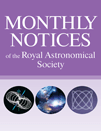
MONTHLY NOTICES OF THE ROYAL ASTRONOMICAL SOCIETY
Charting New Frontiers in Astrophysical Research.The MONTHLY NOTICES OF THE ROYAL ASTRONOMICAL SOCIETY (MNRAS), published by Oxford University Press, serves as a premier platform for the dissemination of significant research in the fields of Astronomy, Astrophysics, and Space and Planetary Science. Established in 1913 and with an impressive impact factor reflected in its 2023 Q1 rankings—13th in Earth and Planetary Sciences and 14th in Physics and Astronomy—this journal is renowned for its rigorous peer-reviewed articles, fostering advancements in our understanding of the universe. Researchers, professionals, and students alike benefit from its rich content, which spans a vast array of topics within its scope, from stellar dynamics to planetary formation. While the journal does not currently offer Open Access options, the scholarly contributions published herein are invaluable for pushing the boundaries of contemporary scientific inquiry and ensuring that the latest findings reach an engaged audience globally.

Frontiers in Astronomy and Space Sciences
Connecting Minds to Unravel the Mysteries of SpaceFrontiers in Astronomy and Space Sciences is a leading open access journal published by FRONTIERS MEDIA SA, based in Switzerland. Since its inception in 2015, this journal has provided a dynamic platform for researchers, professionals, and students to disseminate their findings across a wide spectrum of topics within the field of astronomy and astrophysics. With an impressive 2023 Impact Factor reflecting its relevance and contribution to the scientific community, it ranks in the Q2 category in Astronomy and Astrophysics, demonstrating a solid reputation among peers. The journal's commitment to open access ensures that all published research is freely available, fostering greater collaboration and knowledge sharing among astronomers worldwide. With a diverse range of articles spanning from theoretical investigations to observational studies, Frontiers in Astronomy and Space Sciences is an essential resource for anyone seeking to explore the wonders of the universe and share innovative ideas that push the boundaries of our understanding.